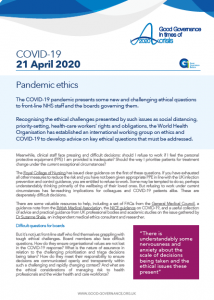Pandemic ethics
21 April 2020

The COVID-19 pandemic presents some new and challenging ethical questions to front-line NHS staff and the boards governing them.
Recognising the ethical challenges presented by such issues as social distancing, priority-setting, health-care workers’ rights and obligations, the World Health Organisation has established an international working group on ethics and COVID-19 to develop advice on key ethical questions that must be addressed.
Meanwhile, clinical staff face pressing and difficult decisions: should I refuse to work if I feel the personal protective equipment (PPE) I am provided is inadequate? Should the way I prioritise patients for treatment change under the current exceptional circumstances?
The Royal College of Nursing has issued clear guidance on the first of these questions. If you have exhausted all other measures to reduce the risk and you have not been given appropriate PPE in line with the UK infection prevention and control guidance, you are entitled to refuse to work. Some may be tempted to do so, perhaps understandably thinking primarily of the wellbeing of their loved ones. But refusing to work under current circumstances has far-reaching implications for colleagues and COVID-19 patients alike. These are desperately difficult decisions.
There are some valuable resources to help, including a set of FAQs from the General Medical Council, a guidance note from the British Medical Association, the NICE guidance on COVID-19, and a useful collection of advice and practical guidance from UK professional bodies and academic studies on the issue gathered by Dr Suzanne Shale, an independent medical ethics consultant and researcher.
Difficult questions for boards
But it’s not just front-line staff who find themselves grappling with tough ethical challenges. Board members also face difficult questions. How do they ensure organisational values are not lost in the COVID-19 response? What is the nature of assurance in relation to the challenging prioritisation and triage decisions being taken? How do they meet their responsibility to ensure decisions are communicated openly and transparently within such a challenging and rapidly changing context? And what are the ethical considerations of managing risk to health professionals and the wider health and care workforce?
Boards are responding to these challenges in different ways. Some have changed the way their ethics committees work and how often they meet – in at least one case moving from quarterly to daily meetings. Others are exploring the possibility of a system-wide approach to ethics, incorporating local government and emergency services as well as health and social care providers in a bid to ensure fairness and consistency. One such new integrated ethics committee is chaired by the local bishop.
There is no single prescribed way to rise to the ethical challenges presented by COVID-19. But the fundamental principles that guide every good board must apply.
It is important to recognise different roles that board members must navigate to enable crucial day-to-day decisions by clinicians, while maintaining the oversight, assurance, and stewardship function of the board.
As ever, taking a system-wide approach is to be commended. Board members are reflecting on how various local ethics fora are engaging with each other, and exploring system-wide collaboration as outlined above. This can benefit boards through access to shared learning, as well as facilitating decision-making at scale in a practical way for local services.
There is understandably some nervousness and anxiety about the scale of decisions being taken and the ethical issues these present. These are not normal circumstances, as the current challenges in relation to the supply of PPE make very clear.
Ethics groups should provide genuine scrutiny and support in these difficult times. The audit trail on decision-making is crucial in times of duress; it will ensure that boards have a clear process for and record of the ethical considerations that have been taken into account.
GGI is working on a board assurance prompt for chairs and non-executive directors of NHS organisations, which will provide a high-level summary of some of the principal ethical challenges related to COVID-19. It will also feature a set of key assurance questions boards should be asking themselves to assess the effectiveness of their response.
If you would like to share the way your board is rising to the ethical challenges presented by COVID-19, we would love to hear from you. If you have any questions or comments about this briefing, please call us on 07732 681120 or email advice@good-governance.org.uk. We will aim to respond within 24 hours.

